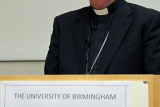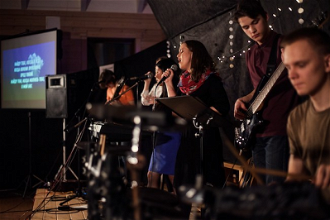Report says Religious Education in schools is being 'killed off'

Michael Gove MP
A report published today, warns that Religious Education is already being marginalised as a consequence of being left out of the 2010 English Baccalaureate, and is set to disappear altogether from the curriculum of many secondary schools. Secretary of State for Education Michael Gove is expected to make an announcement on RE’s inclusion in the EBacc by 19 July.
RE has been a core subject for all pupils since 1870, but this could soon end. Michael Gove’s rapidly implemented plans to shake up the educational system are set to shake out RE. This may not be deliberate but is the inevitable unintended consequence of government actions.
Being left out of the 2010 EBacc is already having devastating consequences in schools. A survey by the National Association of Teachers of RE (NATRE) based on evidence from over half of all state maintained secondary schools in England reports:
• A quarter of all academies and community schools are not providing statutory RE for 14 – 16 year olds.
• This non-compliance is predicted to increase during 2011 – 12.
• GCSE RE entries between 2010-11 and 2011-12 have dropped by more than a third in academies and community schools
• In those schools where entry levels have dropped, over half attribute the drop to the impact of RE being excluded from the EBacc.
Ed Pawson, Chair of NATRE, said: “GCSE Religious Studies is a subject that requires high standards of knowledge and evaluation of evidence. It explores religious and cultural topics and engages in debates over issues of diversity and conflict, ethics, philosophy and social change. It has grown massively in popularity over recent years because students recognise it as a subject of significant relevance to the world they encounter. By excluding RS from the EBacc Michael Gove is effectively squeezing it out of the curriculum in many of our schools across the country. This truly is a cruel blow.”
In the light of new hard evidence about the negative effects of RE having been excluded from the 2010 EBacc, The Religious Education Council of England and Wales (REC) and NATRE, along with the Church of England and the Catholic Church, calls for Religious Education to be included in the English Baccalaureate.
The REC says RE’s exclusion from the EBacc has already caused an avalanche of protest including: A steady stream of press articles and letters; An Early Day Motion in the Commons signed by 111 MPs from all parties; Tabled questions and debates in both the Commons and the Lords; Strong disquiet being expressed by the Parliamentary Select Committee on Education; Bulging postbags of letters to ministers; A 130,000 signature petition to the Prime Minister
Other evidence on the effects of the EBacc excluding RE on schools, students and teachers:
• Two surveys reveal serious concern about the level of compliance in many schools with their local authority’s RE syllabus regarding the following of GCSE courses.
• Current application rates for secondary RE teacher training are down 25% compared to geography down only 9% and history actually up 3%.
• Analysis of Government data reveals that 862 state secondary schools entered no candidates for GSCE Religious Studies in 2010, compared with 137 for Geography and 70 for History
• A further analysis reveals that 25% of academies without a religious character entered no pupils at all for an RE GCSE compared with only 10% of other schools. Given the academy expansion policy, unless remedial action is taken, the future of RE in the school curriculum looks bleak.
Source: REC





















